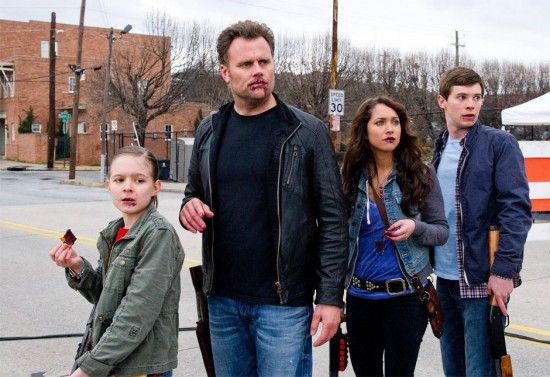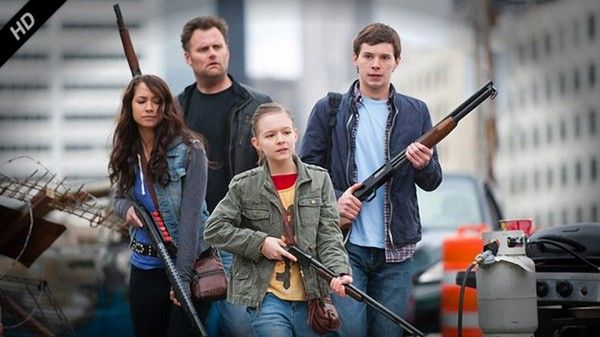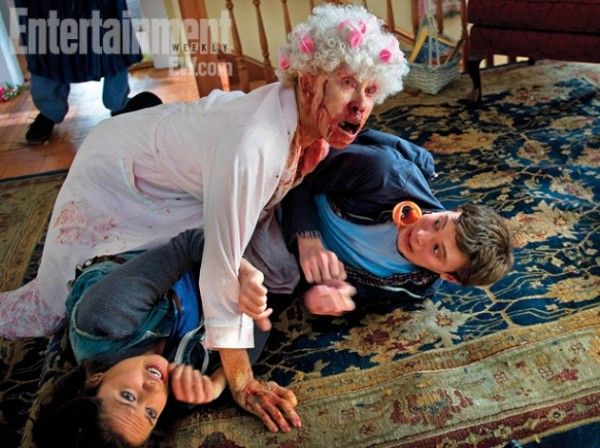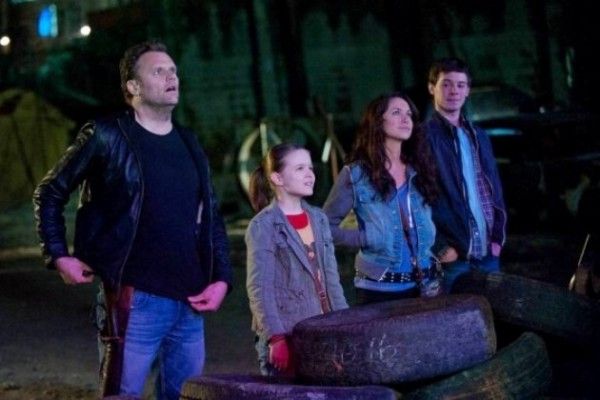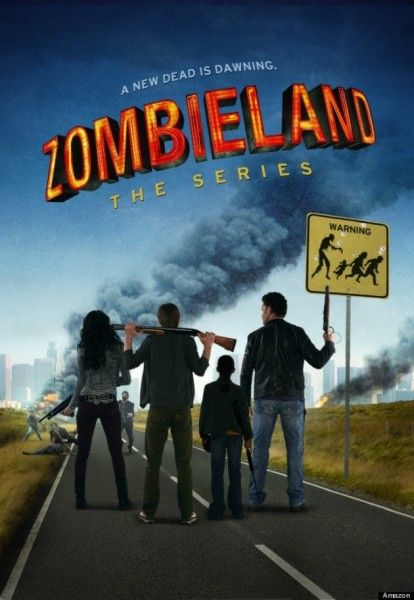Based on the 2009 cult classic film, the Zombieland TV pilot is now available for viewing on Amazon Instant Video, and customer feedback, viewership numbers and other factors will decide whether it will be picked up to series. In the series, fearless foursome Tallahassee (Kirk Ward), Columbus (Tyler Ross), Wichita (Maiara Walsh) and Little Rock (Izabela Vidovic) search for a place to call home while they eliminate zombies along the way.
During this recent interview to discuss the TV version of Zombieland, co-creators and executive producers Rhett Reese and Paul Wernick talked about the journey from TV series to movie and now back to TV pilot, what it’s been like to work with Amazon, what motivated the decision to have the same characters from the movie on the TV show, how they envision it as a road show, how much gore they can have, what Kirk Ward (who was originally cast as Tallahassee before being replaced by Woody Harrelson) brings to this version of the character, what led them to the 30-minute format, whether they could have any surprise cameos (Bill Murray made a very memorable one in the film), what will determine whether the pilot is successful enough to go to series, and when they might know if they’re picked up. Check out what they had to say after the jump.
Question: How did Zombieland end up as a TV show, and how did it evolve to where it is now, on Amazon?
RHETT REESE: Well, we always intended Zombieland to be a television series. We originally sold a pilot script to CBS, back in 2005. They decided not to make it, which was a blessing in disguise because that pilot script was ultimately expanded into the movie Zombieland. When Zombieland came out and succeeded as it did, there was a lot of talk of a Zombieland 2 sequel, and we tried very, very hard to make that happen. Unfortunately, the movie gods didn’t smile on us. We had a few key departures, and any number of factors, that played into Zombieland 2 not happening. And at that moment, we decided, “Well, why not go back to our original passion and our original vision, which was to make Zombieland into a TV series, and we found a partner in Amazon to do that. Now, we’ve brought out the pilot. That’s a little bit of a rough chronology of how it’s all gone down.
How has Amazon been, as a partner?
PAUL WERNICK: Amazon has been amazing. We really feel that they’re trailblazing here, on the content front, putting their pilots up online and letting the viewers decide. Zombieland is a non-traditional show, and Amazon is a non-traditional network and content provider. We’ve really had the creative freedom to do what we want, how we want. They’ve given us incredible resources, dollar for dollar, minute for minute. It’s really on par, budget-wise, with the feature. The feature was shot for $22 million, over the course of an hour and a half, and we’re really on par with that. It’s just been great. And people are clicking on Zombieland and watching it and loving it. It’s been really fun to watch. It’s the ultimate focus group. You put it out there for the public to watch, and they get to decide whether we move forward or not.
What motivated the decision to have the same characters from the movie, instead of coming up with a new batch of characters within the same world?
REESE: That’s a very good question. I think the biggest reason we brought back these specific characters is that, to us, Zombieland really is these characters. Without Tallahassee, Wichita, Little Rock and Columbus, Zombieland really wouldn’t be much more than a title and a tone. It just didn’t make sense to us. We always loved these characters. They were the reason we wrote the movie, in the first place. It’s about a dysfunctional family. It’s about a fearless guy paired with a fearful guy. It’s about two live-by-their-wits, con artist sisters. And at its heart, we just didn’t want to stray from that. We didn’t want to create a bunch of new characters. Now, what that then created was this comparison between new cast and old cast, which is incredibly unfair, in the sense that our first cast was tremendous. We had four Academy Award nominees in the Zombieland movie, and it’s clearly impossible to replace those actors and the indelible market they left. That said, there’s a long history of parts, both on stage and in TV shows, that have become movies, and movies that have become TV shows, with the parts being played by multiple different actors. That is a precedent that has definitely come long before Zombieland. And we think we found a tremendous cast of people who really captured the essence of the characters without imitating the actors who came before them. We’re very, very proud of them. We just want everyone to give them a chance. Our feeling is that the more time they spend with them, the more they’re going to love them and embrace them.
Because of the series format, will viewers get to see a lot of this world that didn’t quite make it into the original pilot and the feature movie?
WERNICK: We do envision this as a road show. We’ll be heading east and traveling towards Detroit, towards the east coast and Fisher Island, to this safe community. We want to actually go on the road and shoot it from location to location, Vegas hopefully being the next spot we hit, and hit spots along the way, like Mt. Rushmore and Graceland. We have to chart it out on a map, but this inherently is a road show and we ideally would love to take the production on the road.
How does working with Amazon versus a regular network impact the amount of gore that you’re able to show?
WERNICK: As far as gore, I don’t think we got overly gory in the movie. We tried to maintain that same level of horror and comedy and heart. We tried to maintain the tone of the movie in the pilot. Amazon’s edict was, “Make the show that you want to make. Make Zombieland.” So, as far as gore goes, you do see some blood and guts, but that’s all part of the tone of the show and something that Amazon encouraged.
Since Kirk Ward was originally cast as Tallahassee before Woody Harrelson, what was it like working with him, post Woody taking on the role? Did it change the way that he interpreted the role, at all?
REESE: Well, we worked with Kirk Ward in 2005, on a show called Invasion Iowa with William Shatner. We fell in love with his talents and him, as a person. So, when it came time to leave reality television, which is what we were trying to do at the time, and write a script, we wrote Zombieland as a spec pilot, and it was really inspired by Kirk. We intended him to play the part of Tallahassee. We wrote the part for him based, on some of his acting strengths and what he likes to do in his physicality and his sense of humor. Ultimately, when Zombieland became a movie, it was impossible to cast Kirk because Hollywood wanted a star, and they found that star in Woody Harrelson, who was just amazing and awesome. Woody left a very indelible mark on Tallahassee. Interestingly, Tallahassee was never really intended to wear a cowboy hat and talk with a more rural accent. He was supposed to be from a big city in Florida. So much of what Woody brought to the role was Woody himself, and it was awesome. He created this wonderful Tallahassee that was different from the Tallahassee we had originally envisioned. So, when it came time to do the series, we had a lot of actors come in to audition. We wanted Kirk, but we had to go through an audition process. We had a million guys come in with shark tooth necklaces and cowboy hats, in t-shirts and jeans, and do the southern accent, and our immediate reaction was that that was a mistake. We didn’t want an actor to try to imitate Woody or invoke Woody because we just thought that would have been playing an actor, as opposed to playing a character. So, when we went to Kirk, we said, “You’ve got to come do this,” and told him not to try to imitate Woody and not to do a southern accent. We said, “We’re not going to put you in a cowboy hat or cowboy boots. We’re going to let you be the urban Tallahassee that we originally imagined, and you just have to be what you originally would have been, in the character.” So, that’s what you see, when you see Kirk playing Tallahassee. You see a different Tallahassee, and one that we enjoy in a very different way from the one that Wood brought to life.
With the 30-minute format, are you envisioning more of a horror sitcom type of show?
WERNICK: No, not really. There’s really nothing like it on TV right now, in the half-hour space. It’s not a sitcom. We’re invoking the horror, the comedy, the heart, the drama, the scares, the thrills and the chills. There’s really no category for what we’re trying to do, and there’s no model for what we’re trying to do, in the half-hour space, which is what’s exciting for us. There was a discussion, when we first were thinking about doing the show in this incarnation, that was about, “Should we do an hour or a half-hour?” Rhett and I very intentionally chose the half-hour space because it did feel trailblazing to us. It felt unique.
How did you find the balance between honoring the movie while keeping the TV series its own entity?
REESE: We’re trying to recreate the movie without imitating the movie, if that makes sense. We want to try to capture the tone of the movie, which is dramatic, scary and funny, with the emphasis on the funny. We want it to have a heart, the way the movie did. We want the relationships to play out similarly to how they were playing out in the movie, and how they would have played out in movie sequels, which is a father-daughter relationship that developed between Tallahassee and Little Rock, and a romance that developed between Columbus and Wichita. Then, we’re bringing back a lot of elements from the movie, like the rules and the zombie kill-of-the-week. We have a lot more of those in store, and not just rules and zombie kills-of-the-week, but also a lot of other fun elements that will bring new jokes that we always had intended to bring in. Overall, we’re not trying to imitate the movie or do exactly what we did in the movie, but we are trying to make it feel like it’s of a consistent tone and world.
WERNICK: We’re continuing on and telling more stories. As the end of the movie, they’re at Pacific Playland. They get in the car and they’re hitting the road. The movie was essentially Episodes 1 and 2 of the show put together. Now, we’re basically hitting the road Episode 3. So, we’re not necessarily trying to emulate it as much as we are just trying to continue to tell that serialized story that we wanted to tell, of a dysfunctional family coming together and trying to survive in a world of zombies.
One thing that people loved about the Zombieland movie was the surprising appearance of Bill Murray. Do you have any plans to, or have you given some thought about, having any surprise cameos on the series?
REESE: It’s a very good question, and the answer is absolutely yes. We will likely see a celebrity cameo, down the road. It’s tough to predict who it will be because celebrities are notoriously hard to pin down and convince, and their schedules are always difficult. Getting Bill Murray into the movie was an absolute miracle. It was a Hail Mary that largely was a function of Woody Harrelson knowing Bill Murray personally, and asking him if he’d be willing to do it, and we found a little window in his time and got him the script. It was crazy! It was very lucky. He got the script about three days before he showed up on set. It was that touch and go. So, yes, we absolutely plan to do it. It may be difficult to find the right person, and we won’t do it unless it is the right person, but we’re going to try hard.
The Zombieland zombies are not the traditional George Romero zombies. What kinds of mythology or zombie rules have you crafted for the TV show?
REESE: We’re basically using the 28 Days Later model. Our zombies are infected humans who are fast, and they’re not undead. We are not adhering to some of the previous zombie rules, like zombies don’t eat other zombies. You see a zombie eating another zombie, in the opening scene of the pilot. And you don’t have to shoot the zombie in its head, in order to kill it. We have a moment where Tallahassee shoots a zombie in the chest and it dies because they’re just human beings. They’re human beings whose brains have been ravaged by a virus. So, just depending on when they got bit, you’ll see some variation. We’ll have some smarter zombies, some stupider zombies, and some more impaired zombies and less impaired zombies. Beyond that, I don’t think we’re going to get too much into the mythology. Ultimately, we hope to be able to lead our heroes to a place that’s zombie-free, or maybe find a cure, or something like that. Maybe we’ll get there, at some point, but we’re trying not to burden ourselves too much with how this happened or why it happened, or where we’re headed, with regard to that.
What is it about zombies that intrigues and terrifies you?
WERNICK: For us, it’s that the post-apocalypse, unlike The Walking Dead, has great wish fulfillment. You’re one of the last few humans on earth. You don’t have to deal with traffic. You can drive any car you want. You can go into any shop you want. You can kill with reckless abandon. It’s this idea that the post-apocalypse is cool. The post-apocalypse is not that scary a place, or at least there are scares in it, but there’s also some wonderful things in it too. That was something that we embraced in the movie, and something that we’re embracing in the show.
How will you know whether the pilot is successful enough to go to series?
WERNICK: It’s the ultimate focus test in front of America, having them decide whether they like it enough to take it to series. It’s really a meritocracy, and one we embrace. Oftentimes, whether pilots go to series or not is decided by a couple of executives in suits and a room full of 20 random people that are selected for various reasons, and whether they like it or not. So, I think putting it in front of the public is really an exciting way to decide whether to move forward or not on a project. Ultimately, we believe in our show and we feel America will embrace it enough to take it to series.
Has Amazon give you any kind of time frame for finding out whether Zombieland will get picked up as a series?
REESE: We’ve been told that the pilot will be available for about a month and that, at some point, either during or after that month, we’ll get a better indication of whether we’re going to series. So, it could be very soon, or it could be three or four weeks down the road. We’re not exactly sure.
WERNICK: They’re using a whole host of data to figure this all out. They’re using clicks. They’re using how many people watch it all the way through, in the first sitting, or if you put it on pause, or if you stop it. Amazon can track what you had for breakfast this morning. So, they’re using a whole host of data to make those decisions, including reviews and clicks, and everything like that. We’re in the public’s hands.
If the show does get picked up, what kind of time frame would you need to get the cast and crew together, to start shooting again?
WERNICK: Well, we’re hoping to get back up and running by early summer, and start shooting in early fall, and soon thereafter go to series with it.
Zombieland is now available to view on Amazon.

